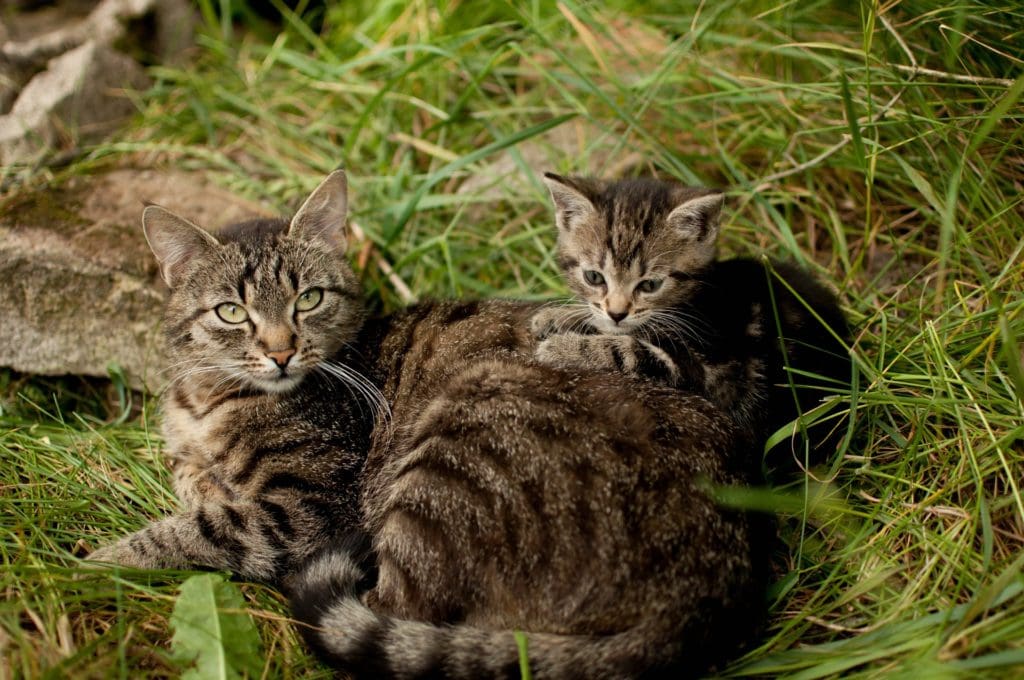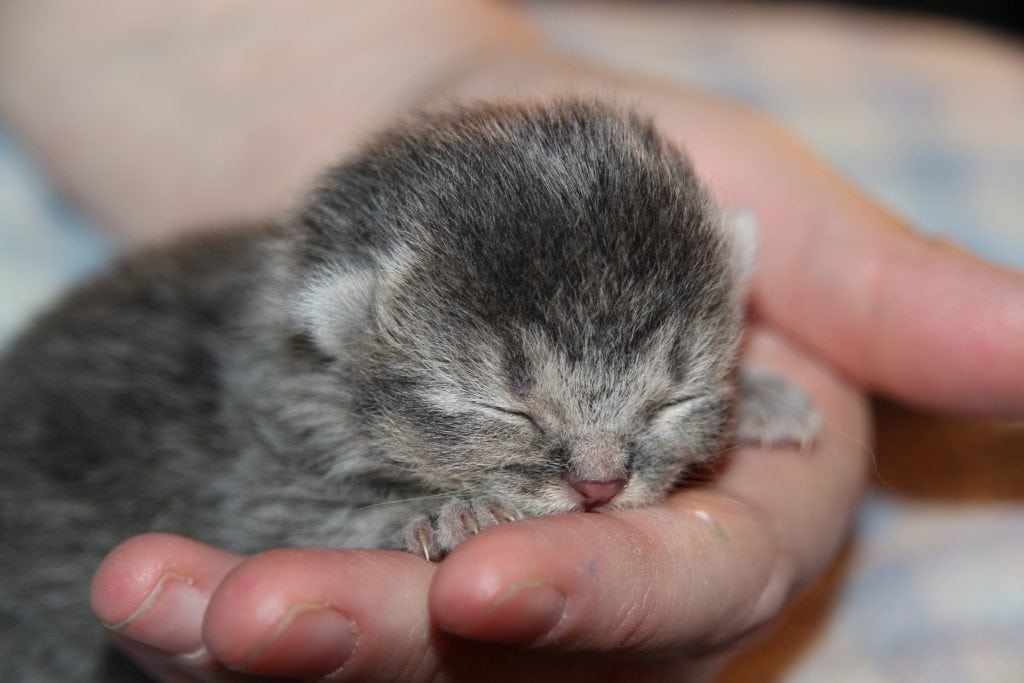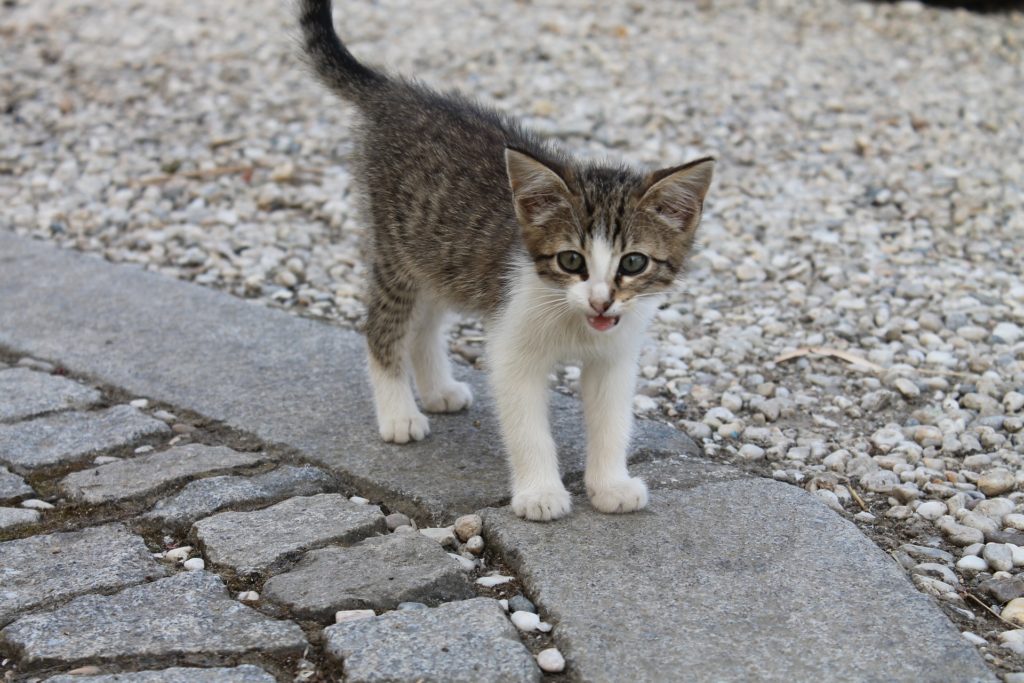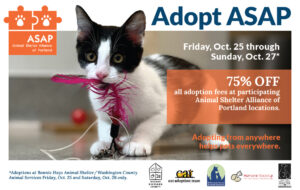When you come across a kitten or litter of kittens alone outdoors, you may feel the need to scoop them up and take them inside — but that might not be the best thing for them (or for you!). Read on to learn how you can best help kittens found outdoors.
Wait for the mother cat to return
While it might seem like the kittens have been orphaned, most kittens are not abandoned by their mother.
Keeping kittens with their mother is ideal, so it’s important to give
the mother cat time to return. If the kittens are in an exposed or
unsafe area (e.g. near a street or on a sidewalk), you can move them a
short distance to a safer location, such as under a nearby bush. You
could also put the kittens into a cardboard box that you place close by,
but out of the way of traffic and predators. These options will help
protect the kittens while keeping them where their mother can easily
find them again.

Once the kittens are in a safe spot, wait for their mother to return. It could be several hours before she comes back. Often, she has simply been away getting food. Sometimes she’s nearby, but is hiding until you leave. Watch from inside, or at least from a good distance, so the mother cat feels comfortable returning to her kittens.
Separating kittens from their mother too early can cause problems for both the kittens and mother cat — especially if the kittens are still nursing. Taking kittens who are not weaned away from their mother puts kittens at greater risk of illness, and it puts the mother at risk for mastitis, a painful and life-threatening condition. It can also mean a big commitment from you, as unweaned kittens will require specialized round-the-clock care. Kittens also learn important life and social skills from their mother. Research shows that hand-raised kittens may suffer more health and behavior problems throughout their lifetime.
If the mother cat returns
After the mother cat comes back, you can take additional steps to help to keep the feline family healthy and safe.
If the mother cat seems friendly, you may opt to bring all of them into your home. It’s best to keep the entire family together in a small, quiet, enclosed space such as a bathroom or spare bedroom. You’ll want to provide cat food, water, and a litter box. Be sure to have the mother scanned for a microchip, check your local animal shelters’ “lost cat” listings, and put up “found cat” flyers in your neighborhood so that you can reunite her with her family if she has one.
If the mother cat is feral (not socialized with people), you should ideally leave the kittens with her outdoors unless they are in immediate danger. Provide a makeshift shelter using a Styrofoam cooler with a cutout doorway. You may also provide cat food and water, but pick up all traces of food at night so as not to attract predators.
Even if the mother is feral, her kittens will need to be socialized for adoption into a home. You should begin socializing kittens as soon as possible. Socializing kittens can be time-consuming, but it’s the only way they’ll be able to enjoy life as a companion pet! Most of the essential socialization that kittens need should take place before they turn eight weeks old. Handle the kittens gently to get them used to being picked up and held. Young children should sit down quietly on the floor/ground with kittens in their lap so they don’t inadvertently hurt the kitten (and vice versa!). Here’s more information about how to socialize kittens (PDF).
Cats can get pregnant as young as four months of age, so it’s ideal to get mama cat and kittens spayed or neutered as soon as possible. Kittens can have surgery once they are two months old and weight at least two pounds. The mother cat can be spayed as soon as the kittens are weaned.

If no mother cat appears
If
it has been several hours and no mother cat returns, you may decide to
take the litter in. Keep in mind this can be a significant commitment
for you, especially if the kittens are unweaned. Many shelters cannot
take in young kittens right away or at all due to limited resources and
foster home availability. In fact, kittens younger than 8 weeks old are
often at risk of euthanasia, since most shelters do not have the
resources to provide bottle-feeding or other 24-hour care. You may
choose to care for the litter yourself, at least until the kittens are
old enough for adoption. If you are seeking help from an animal shelter
or rescue group, call or email first; most are not able to take cats or
kittens on a walk-in basis.
Kittens younger than four weeks old will need to be bottle-fed every few hours with a feline milk replacement (not cow’s milk), and will need assistance with eliminating. Motherless kittens this young need specific care. By about four weeks old, kittens have begun the weaning process and can begin eating a mixture of canned cat food and water. You can learn more about caring for orphaned kittens by watching these online videos.
By age six to eight weeks, kittens can start eating dry cat food in addition to canned food. At this age, you may be able to take them to a shelter, where they can either go into foster care for a couple more weeks or become available for adoption. Start calling shelters and rescue groups a week or two in advance so you know what options are available. You may also choose to try to find a home for the kittens on your own.
You can help kittens and mother cats by being informed, knowing when to take action, and getting involved when help is needed. Thank you for learning more today!
Quick Guide to Helping Outdoor Kittens
- Most kittens are not abandoned by their mother. Before you move the kittens, read this information about what to do when you find kittens outdoors.
- Be sure to keep the mother cat and kittens together; separating them can cause problems for both the kittens and mother.
- Provide cat food and make sure there is access to fresh water.
- Never confine a lactating female cat to a cage or trap—her kittens need to feed every few hours and she will be a risk for mastitis if she can’t nurse her kittens.
- If you cannot find the mother cat, read through this information about how to care for newborn kittens and neonatal kitten care.
- If you wish to socialize and care for the kittens yourself, please consider this information from Alley Cat Allies about what it takes to care for very young and/or feral kittens. You may also find these Orphaned Kitten Care: How-To Videos helpful.







